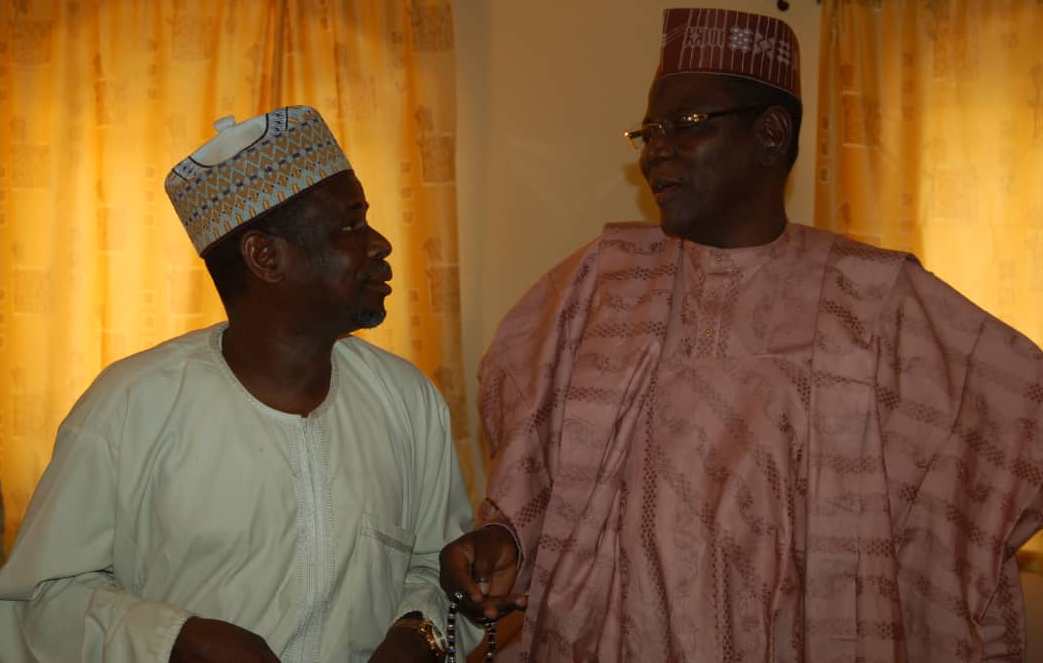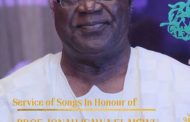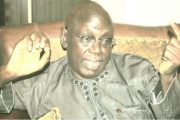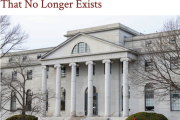By Adagbo ONOJA
Meeting Alhaji Mamman Said again for the first time in six years was bound to be an emotionally and ideologically charged walk back in memory. What happened that within a year, we were both out of Government House, Dutse where we were two of a kind up to the second year of the Second term of Alhaji Sule Lamido’s governorship of Jigawa State? Officially, he had no title than the Katsina born childhood friend of Sule Lamido. That was unlike me who was, officially, the Special Adviser to the governor on Media Affairs. But we both enjoyed numerous complimentary as well as uncomplimentary tags. Even the governor himself had his own tag for both of us. He regularly introduced us as his “personal irritants”. It was his own way of saying we were an insistent source of pressure he could do without. But that was the paradox of the situation at hand. For, it seemed that the quality access he allowed the two of us was a demonstration of his own awareness of the danger of being his own godfather and, hence, the need to allow mediation of his exercise of power by a duo of “personal irritants”. The tragedy is that, by a curious combination of things still not clear, Lamido lost all his most carefully cultivated “personal irritants” by 2013. Why does that matter?
 Why it matters is how, as a result of the break-up as well as Lamido’s loss of most of his lieutenants, all of us involved in that exceptional moment in governance in the history of Nigeria cannot beat our chest and claim that past. How could there be celebration if none of the aides, appointees and lieutenants at the time are any more with him again? Several of them are now in the All Progressives Party while a few others are elsewhere. Meanwhile, Lamido as a governor gave a lie to many things governments in Nigeria claim are impossible. In fact, by September 2007, three months after taking over power, he could make the statement that nobody went to bed hungry in Jigawa State. That was an empirically challengeable claim but philosophically true. And it is a record in the history of governance in Nigeria. There were so many acts of such high mindedness. The climax might be the 2008 Jigawa Talakawa Summit which completely reversed the theory and practice of anti-poverty politics. If poverty is such a terrible thing as we are made to believe, let us hear it from the mouth of those who experience it, not from those in IMF/World Bank headquarters or overfed Ministers of Finance throwing about figures and models informed by their own realities rather than those of the poor. It was a phenomenal success as both the traditional authority, (the Sultan and the over a dozen emirs), Christian leaders, the civil society and think tanks bought into it. Differing interpretations of what it was all about, local fears and the technocratic base to push it further saw to its demise but a statement was made. And so on and so forth! As at today, there is not this group to celebrate this.
Why it matters is how, as a result of the break-up as well as Lamido’s loss of most of his lieutenants, all of us involved in that exceptional moment in governance in the history of Nigeria cannot beat our chest and claim that past. How could there be celebration if none of the aides, appointees and lieutenants at the time are any more with him again? Several of them are now in the All Progressives Party while a few others are elsewhere. Meanwhile, Lamido as a governor gave a lie to many things governments in Nigeria claim are impossible. In fact, by September 2007, three months after taking over power, he could make the statement that nobody went to bed hungry in Jigawa State. That was an empirically challengeable claim but philosophically true. And it is a record in the history of governance in Nigeria. There were so many acts of such high mindedness. The climax might be the 2008 Jigawa Talakawa Summit which completely reversed the theory and practice of anti-poverty politics. If poverty is such a terrible thing as we are made to believe, let us hear it from the mouth of those who experience it, not from those in IMF/World Bank headquarters or overfed Ministers of Finance throwing about figures and models informed by their own realities rather than those of the poor. It was a phenomenal success as both the traditional authority, (the Sultan and the over a dozen emirs), Christian leaders, the civil society and think tanks bought into it. Differing interpretations of what it was all about, local fears and the technocratic base to push it further saw to its demise but a statement was made. And so on and so forth! As at today, there is not this group to celebrate this.
If this does not worry anyone else, it should worry myself and Alhaji Mamman, being the longest of all those who worked with him as comrades and, arguably, the ones who exercised the most influence on his own exercise of power. It doesn’t matter what Lamido thought of me, for example, throughout the decade I worked with him: a loyalist, a guinea pig or even an indentured labourer. Such didn’t matter then and wouldn’t matter now because, in spite of whatever he thought, he remained receptive to inputs, from policy initiatives to conduct of government affairs and so on.
Secondly, it should provide every one of us with an opportunity to think more deeply about how the world works or what makes the world work the way it does? Is it destiny? Fate? Chance? Clash of evil and goodness or power or, all of the above? In relating this to the dispersal, how could this happen with a member of the original founders of the People’s Democratic Party, (PDP) and someone who permanently reminded himself of his ‘PRP’ tendency? Is this the truism of the late Dr Stanley Macebuh’s theory that we all need a godfather? Lamido never had a godfather. He was his own godfather. The closest he ever came to a godfather was in Obasanjo. OBJ did penetrate him by appointing him Foreign Affairs Minister, a reality which closed a gap in his life. Unfortunately, the relationship between him and Obasanjo did not develop. I wouldn’t know who got it into the mud.
Might we be dealing with destiny? There is a sense in which the tragedy of the dispersal was categorically predicted. It was categorically predicted when he was Minister for Foreign Affairs under Obasanjo that General Buhari would come to power and Sule (Lamido) would suffer. That was early 2003. Majority of those who left Lamido are in APC, the president’s party. Always mindful of that prediction by someone who is very much alive and politically active, there was persistent effort to keep the gulf between him and Buhari at the ideological level and nothing more. In 2015, this involved an open letter to him on his loud opposition to a power transfer process that the key actors had already signed on to, even beyond Nigeria. Although it got him thinking, it probably came too late.

L-R: Ahmed Gumel, Lamido’s Deputy, Mamman and Lamido
Questions, questions and questions for a duo standing at a point to reflect upon such questions. It is not so much for or about Sule Lamido as a person but as they relate to the problems of agency, leadership and power in Nigeria. By implication, this is also about Alhaji Mamman as someone that a reasonable Nigerian political party should sponsor to power: Is it the system that destroys promising individuals or individuals are just not good enough? What is to be done about it?
A meeting again between the two of us when opportunity presented itself from December 16th to 18th, 2018 was thus a big deal. Still his chatty, irrepressible and upbeat self, he is thriving in Kano. Told of one’s trip to Kano barely an hour before the flight, he was already at an address where he wanted me to meet him. So persuasive one had to abandon one’s group and take a ride direct to meet him, the first time we would be meeting again since June 2012 when one left Dutse.
He was a very reliable fallback, both in Foreign Affairs and in Dutse. Relationship with Lamido had reached a level where one did not observe any protocols in day to day interactions. Still, there could be difficult moments. One example might suffice. The grand preface to Lamido’s governorship as soon as victory in the 2007 election was guaranteed and swearing-in was drawing near was, this is a PRP government; the very first time there would be such a party in power again after the 1978 – 1983 ‘revolution’ in Kano and Kaduna was crushed in the December 1983 coup. This government, therefore, has to be exceptional in performance and in whatever it does. Specifically, the ministries scattered all over Jigawa State would be re-assembled on Day One, there would be no room for sycophancy and sycophants nor would there be room for First Ladyism, etc, etc.

The author
As marching orders, these did not present Lamido’s publicist any problems in terms of execution. But the day after could be uneasy. In the case of the anti-First Ladyism, the announcement basically amounted to overwriting the governor’s wife, the equivalent to stabbing someone at the back. In this case, an easy going someone one knew long before her husband became Foreign Affairs Minister and then governor. Her Excellency never complained but there were people who would not take it and took their case to the governor. Not that the governor ever called to rebuke me, even playfully. In fact, one was there when he was replying the complainants on the phone. With Lamido, there was nothing to worry about such matters. But Lamido is governor up, up there while Onoja is an SA, down, down here. Even though distant observers of Government House ascribed more powers than one ever actually sought or craved, much less exercised, there were no illusions. The long and short of it is that, in such moments, it was Alhaji Mamman aka ‘Distinguished’ whose intervention was more effective. And he did it many times and over as for a bonding to develop. He was considerate and balanced in judging situations just as he was frank, perhaps even more than Lamido. He was never greedy and he is a radical. It was from him I learnt about Prime Minister Patrice Lumumba’s last words before he was killed. Above all, he was even closer to Lamido in his own way. They quarrelled more often but none lasted more than five to ten minutes before they were seen together again riding privately to the governor’s village or somewhere like that. He did his job of irritating the governor more than I ever did perhaps because, unlike myself, there is very little or no age gap between the two.
So, the puzzle about how it happened that all two of us were out of the place in a short space. Was it a coincidence or something systematic? Was it for something past or in view? Surprisingly, this did not come up in Kano penultimate week, probably because, in the end, it doesn’t matter anymore. Still, there is something troubling there. What explains this dispersal of a core of dedicated elements around Lamido? It was, indeed, a core, stretching from those who went round Nigeria contacting everyone with connection to the NEPU-PRP tradition of politics and the subsequent huge gatherings in Dutse that characterised much of Lamido regime, especially the First term. Nice meeting Alhaji Mamman again!




























